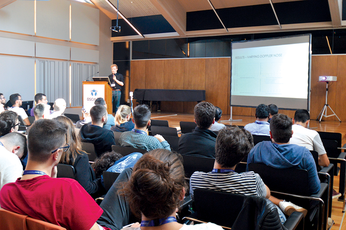Space science for everyone at the Open Source CubeSat Workshop
CubeSat Workshop

The CubeSat community gathered in Athens, Greece to explore the possibilities for open hardware and open source software in space.
The Open Source CubeSat Workshop took place at the Athens Conservatory in Athens, Greece on October 14-18, 2019 [1]. The LibreSpace Foundation [2], which is sponsored by the European Union and the European Space Agency, organized the event. The general philosophy of the LibreSpace Foundation is to remove the barriers of confidentiality and secrecy involved in satellite development and to facilitate sharing of information on how to build and operate CubeSats.
CubeSats are miniature satellites used for scientific research in space [3] [4]. The most basic CubeSat is a 10cm cube that weighs a maximum of 1.33 kilograms (2.9 pounds). The tiny CubeSat is small enough to ride along as a secondary payload on government and commercial space launches. CubeSats have also been launched from the International Space Station. In all, more than 1,100 CubeSats have been launched into space, carrying a variety of experiments – many created by university students and amateur scientists.

[...]
Buy this article as PDF
(incl. VAT)
Buy Linux Magazine
Subscribe to our Linux Newsletters
Find Linux and Open Source Jobs
Subscribe to our ADMIN Newsletters
Support Our Work
Linux Magazine content is made possible with support from readers like you. Please consider contributing when you’ve found an article to be beneficial.

News
-
Cairo Dock 3.6 Now Available for More Compositors
If you're a fan of third-party desktop docks, then the latest release of Cairo Dock with Wayland support is for you.
-
System76 Unleashes Pop!_OS 24.04 Beta
System76's first beta of Pop!_OS 24.04 is an impressive feat.
-
Linux Kernel 6.17 is Available
Linus Torvalds has announced that the latest kernel has been released with plenty of core improvements and even more hardware support.
-
Kali Linux 2025.3 Released with New Hacking Tools
If you're a Kali Linux fan, you'll be glad to know that the third release of this famous pen-testing distribution is now available with updates for key components.
-
Zorin OS 18 Beta Available for Testing
The latest release from the team behind Zorin OS is ready for public testing, and it includes plenty of improvements to make it more powerful, user-friendly, and productive.
-
Fedora Linux 43 Beta Now Available for Testing
Fedora Linux 43 Beta ships with Gnome 49 and KDE Plasma 6.4 (and other goodies).
-
USB4 Maintainer Leaves Intel
Michael Jamet, one of the primary maintainers of USB4 and Thunderbolt drivers, has left Intel, leaving a gaping hole for the Linux community to deal with.
-
Budgie 10.9.3 Now Available
The latest version of this elegant and configurable Linux desktop aligns with changes in Gnome 49.
-
KDE Linux Alpha Available for Daring Users
It's official, KDE Linux has arrived, but it's not quite ready for prime time.
-
AMD Initiates Graphics Driver Updates for Linux Kernel 6.18
This new AMD update focuses on power management, display handling, and hardware support for Radeon GPUs.

